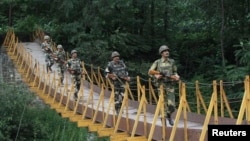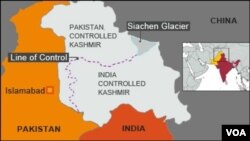ISLAMABAD, PAKISTAN —
Pakistan and India have agreed to take steps to ensure a cease-fire along the Line of Control in disputed Kashmir. The agreement came at a Tuesday meeting of senior military commanders, the first such interaction in 14 years.
The much-anticipated meeting lasted two hours and took place at the Wagah crossing near Pakistan's city of Lahore. Both sides have described the talks between their Director Generals Military Operations [DGMOs] as “cordial, constructive, and fruitful.”
A joint statement issued after the meeting says that Pakistan's Major-General Aamer Riaz and his Indian counterpart, Lt. General Vinodh Bhatia, discussed ways to de-escalate tensions along the Line of Control [LoC], which divides Kashmir between the nuclear-armed neighbors. It added that the DGMOs also agreed to “re-energize existing mechanisms” to maintain peace and cease-fire” of the de facto border.
A mutual cease-fire in Kashmir has largely held since 2003 with occasional low-level violations. This year, however, saw an increase in incidents. A series of clashes caused the death of several soldiers on both sides and strained bilateral ties. Each side blamed the other for starting the incidents.
But tensions in Kashmir have largely subsided since Pakistan's Prime Minister Nawaz Sharif took office in June and promised to improve ties with India.
Officials and analysts, however, do not foresee the resumption of a wide-ranging “composite” dialogue on long-running disputes including Kashmir until after India’s general elections due by May of next year.
Speaking to VOA prior to Tuesday’s meeting, Pakistan’s adviser on national security and foreign affairs, Sartaj Aziz, reported progress in bilateral contacts, but admitted the formal dialogue will have to wait until after the Indian elections.
“The dialogue is being resumed in some sectors like trade, power purchase [from India], visa agreement and a couple of other things," said Aziz. "So, it is resuming but obviously, the broader issues probably will have to wait 'til after the elections and I hope that there will be major improvement in both the dialogue process and the relationship after the elections.”
For its part, India apparently has shown little interest in the resumption of the broad-based peace dialogue and wants Islamabad to meet certain conditions. These include speeding up of the trial of several Pakistani suspects accused of playing a role in the 2008 Mumbai terrorist attacks.
Meanwhile, Aziz reiterated that India and Pakistan need to take urgent steps to pull out forces from the disputed Siachen Glacier.
“We have been discussing the Siachen issue with India and there has been a lot of progress, but every time on the basis of some small issues the whole thing gets stuck. But now I think the environmental lobbies in both India and Pakistan should press their respective governments to resolve this issue as early as possible because the environmental damage that we are causing to Siachen since 1984 is irreparable if we don’t solve that problem quickly,” said Aziz.
The standoff on Siachen began in 1984 when Indian troops took control of heights on the uninhibited glacier, and Pakistan established posts on its side. Since then, the conflict has cost billions of dollars and killed thousands of soldiers. Both sides blame extreme weather for most of the deaths.
The glacier is at the northern tip of the Kashmir boundary. Pakistani officials believe that Siachen is the easiest of all the disputes plaguing bilateral relations. But officials in Islamabad are reported as saying that New Delhi wants to address the issue as part of an overall settlement of the Kashmir dispute.
The much-anticipated meeting lasted two hours and took place at the Wagah crossing near Pakistan's city of Lahore. Both sides have described the talks between their Director Generals Military Operations [DGMOs] as “cordial, constructive, and fruitful.”
A joint statement issued after the meeting says that Pakistan's Major-General Aamer Riaz and his Indian counterpart, Lt. General Vinodh Bhatia, discussed ways to de-escalate tensions along the Line of Control [LoC], which divides Kashmir between the nuclear-armed neighbors. It added that the DGMOs also agreed to “re-energize existing mechanisms” to maintain peace and cease-fire” of the de facto border.
A mutual cease-fire in Kashmir has largely held since 2003 with occasional low-level violations. This year, however, saw an increase in incidents. A series of clashes caused the death of several soldiers on both sides and strained bilateral ties. Each side blamed the other for starting the incidents.
But tensions in Kashmir have largely subsided since Pakistan's Prime Minister Nawaz Sharif took office in June and promised to improve ties with India.
Officials and analysts, however, do not foresee the resumption of a wide-ranging “composite” dialogue on long-running disputes including Kashmir until after India’s general elections due by May of next year.
Speaking to VOA prior to Tuesday’s meeting, Pakistan’s adviser on national security and foreign affairs, Sartaj Aziz, reported progress in bilateral contacts, but admitted the formal dialogue will have to wait until after the Indian elections.
“The dialogue is being resumed in some sectors like trade, power purchase [from India], visa agreement and a couple of other things," said Aziz. "So, it is resuming but obviously, the broader issues probably will have to wait 'til after the elections and I hope that there will be major improvement in both the dialogue process and the relationship after the elections.”
For its part, India apparently has shown little interest in the resumption of the broad-based peace dialogue and wants Islamabad to meet certain conditions. These include speeding up of the trial of several Pakistani suspects accused of playing a role in the 2008 Mumbai terrorist attacks.
Meanwhile, Aziz reiterated that India and Pakistan need to take urgent steps to pull out forces from the disputed Siachen Glacier.
“We have been discussing the Siachen issue with India and there has been a lot of progress, but every time on the basis of some small issues the whole thing gets stuck. But now I think the environmental lobbies in both India and Pakistan should press their respective governments to resolve this issue as early as possible because the environmental damage that we are causing to Siachen since 1984 is irreparable if we don’t solve that problem quickly,” said Aziz.
The standoff on Siachen began in 1984 when Indian troops took control of heights on the uninhibited glacier, and Pakistan established posts on its side. Since then, the conflict has cost billions of dollars and killed thousands of soldiers. Both sides blame extreme weather for most of the deaths.
The glacier is at the northern tip of the Kashmir boundary. Pakistani officials believe that Siachen is the easiest of all the disputes plaguing bilateral relations. But officials in Islamabad are reported as saying that New Delhi wants to address the issue as part of an overall settlement of the Kashmir dispute.

